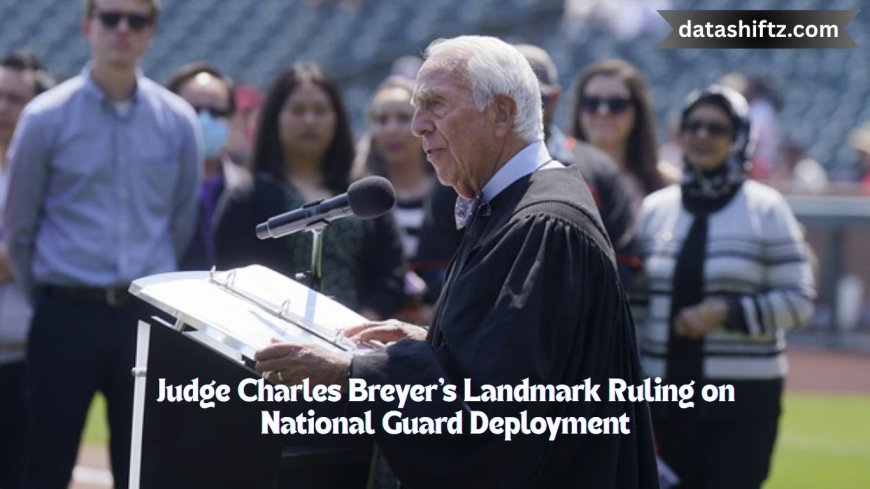Judge Charles Breyer's Landmark Ruling on National Guard Deployment

Introduction
On June 12, 2025, U.S. District Judge Charles Breyer delivered a significant ruling that challenges the extent of presidential authority over state military forces. The case centers on former President Donald Trump's decision to federalize 4,000 California National Guard troops to Los Angeles amid protests against immigration raids. Judge Breyer's decision has sparked a national debate on the balance of power between federal and state governments.
Background of the Case
The controversy began when President Trump ordered the deployment of National Guard troops to Los Angeles to manage escalating protests. California Governor Gavin Newsom opposed the move, arguing that it violated the Tenth Amendment, which reserves powers not delegated to the federal government to the states. The state filed a lawsuit, seeking to block the deployment and return control of the National Guard to state authority.
Judge Breyer's Ruling
Judge Breyer ruled that President Trump's action was unconstitutional, stating that the deployment exceeded presidential authority and infringed upon state sovereignty. He emphasized that the protests, while disruptive, did not meet the legal threshold of "rebellion" that would justify federal intervention without state consent. Breyer's decision reflects a commitment to upholding constitutional limits on executive power.
Immediate Aftermath
The ruling was met with mixed reactions. Governor Newsom praised the decision as a victory for democracy and constitutional governance. In contrast, President Trump criticized the ruling, asserting that the federal intervention was necessary to maintain order and protect federal interests.
Legal Developments
Hours after Judge Breyer's ruling, the Ninth Circuit Court of Appeals issued a temporary stay, allowing the federal deployment to continue pending further hearings. This development underscores the ongoing legal complexities surrounding the case and the broader implications for federal-state relations.
Broader Implications
This case highlights the evolving interpretation of constitutional principles in the context of modern governance. It raises critical questions about the scope of executive power, the autonomy of state governments, and the mechanisms through which citizens can challenge federal actions.
Conclusion
Judge Charles Breyer's ruling serves as a pivotal moment in the ongoing dialogue about the balance of powers in the United States. As legal proceedings continue, the case will likely influence future interpretations of constitutional law and the relationship between federal and state authorities.
Summary
-
Case: President Trump's federalization of California National Guard troops.
-
Judge: Charles Breyer, U.S. District Judge for the Northern District of California.
-
Decision: Declared the federalization unconstitutional, citing overreach of presidential authority.
-
Immediate Action: Ninth Circuit Court of Appeals issued a temporary stay on the ruling.
-
Broader Impact: Raises questions about federal-state power dynamics and constitutional interpretation.
Timeline of Events
| Date | Event |
|---|---|
| June 12, 2025 | Judge Breyer rules against federalization of National Guard troops. |
| June 12, 2025 | Ninth Circuit Court of Appeals issues temporary stay on Judge Breyer's ruling. |
| June 13, 2025 | Governor Newsom praises the ruling; President Trump criticizes the decision. |
| June 17, 2025 | Scheduled hearing to discuss the preliminary injunction. |
Legal and Constitutional Considerations
-
Tenth Amendment: Protects states' rights and limits federal powers.
-
Presidential Authority: Bound by constitutional limits, especially regarding state military forces.
-
Judicial Oversight: Courts play a crucial role in interpreting constitutional boundaries.
Conclusion
Judge Charles Breyer’s recent ruling marks a pivotal moment in the ongoing debate over federal and state authority in the United States. By striking down former President Trump’s order to federalize the California National Guard, Judge Breyer reaffirmed the constitutional principle that states retain control over their military forces unless specific, extreme conditions—such as rebellion or insurrection—are met.





























